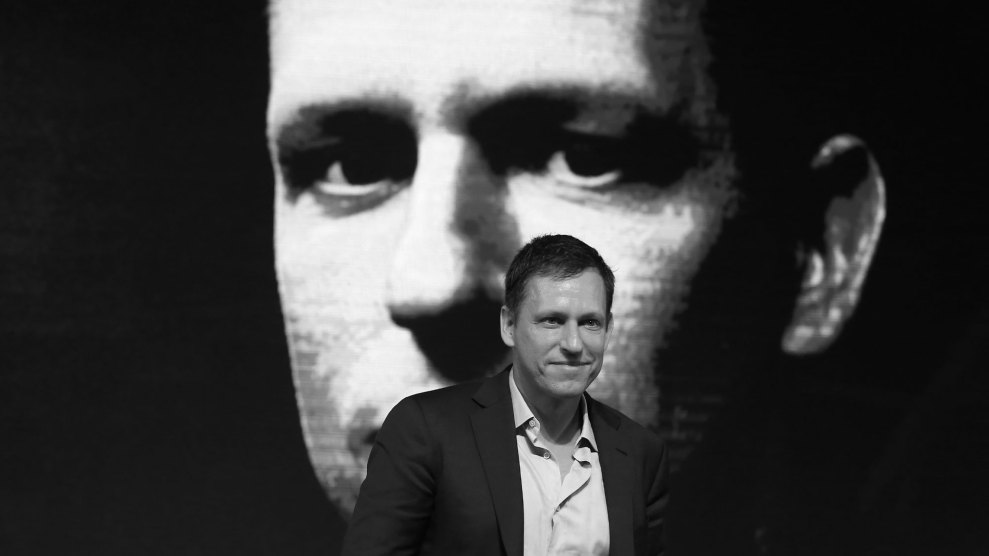Earlier this summer, I showed up uninvited at a midtown Manhattan music venue, where a startup named the Praxis Society was holding an event as part of a weeklong series to promote its flagship product: a free-market Mediterranean city-state the company hopes to build under the leadership of a CEO who, former employees said, is interested in fascist authors and occultism and has touted a book that argues Black people are intellectually inferior to whites.
I assumed I might get turned away, but after glancing at my ID, a security guard waved me inside, where Zoomers and young millennials made up most of the thin crowd and underground drill rappers performed for the mostly half-interested and mostly white audience. “I heard Peter Thiel is funding this,” a guest in a camo hat told me with wide eyes. The right-wing billionaire’s name kept coming up throughout the night. Indeed, he does have a connection to Praxis. A Thiel-backed venture capital fund, along with a group of investors with ties to the PayPal co-founder, have poured millions into the quixotic project.
Guests also kept mentioning the “downtown scene,” the collection of edgy, anti-woke podcasters, Substackers, and influencers who share a belief that resistance-style liberalism and everything downstream of it is passé. It’s this crowd that Praxis—which spends lavishly on throwing parties—has courted as it attempts to attract members to buy-in (sometimes literally) to its utopian “cryptocity” vision.
Praxis, a for-profit corporation, was founded as Bluebook Cities in 2019 by Californian Dryden Brown and former Boston College wide receiver Charlie Callinan. They envisioned an autonomous enclave where the free-market dreams of Chicago and Austrian school economists would become reality, a place libertarians could settle without the tyranny of regulation. While the project draws inspiration from ancient Greece and Rome, Brown, the company’s CEO, said in a 2021 interview that its style would be “hero futurism” with a “neo-Gilded Age kind of aesthetic.”
If this sounds like fantasy, it probably is. But it’s one that’s captured the minds of real—and really rich—people. In 2021, the company’s seed round raised roughly $4 million, including from Pronomos Capital, a libertarian city-building fund started in 2019 with significant financial backing from Thiel. Other participants included Thiel’s close friend Balaji Srinivasan; Joe Lonsdale, who cofounded the analytics and intelligence company Palantir Technologies with Thiel; and Bedrock Capital, a fund launched by a former partner in Thiel’s Founders Fund. Praxis followed up several months later with a Series A round that brought in $15 million, much of it from cryptocurrency investors, including Three Arrows Capital and Sam Bankman-Fried’s Alameda Research, which both later spectacularly imploded. Emergent Ventures, another Thiel-backed fund led by economist Tyler Cowen and housed in George Mason University’s Koch-supported Mercatus Center, has also invested.
From Ayn Rand’s Atlas Shrugged to New Hampshire’s Free State Project, libertarians have long fantasized about creating their own self-governed polities. In 2008, Thiel put up money to start the Seasteading Institute, which aimed to create artificial island-based cities outside the reach of government. Its founding director, Patri Friedman—an anarcho-capitalist who is a grandson of economist Milton Friedman—runs Pronomos Capital.
By bankrolling Praxis, Pronomos and the other Thiel-allied investors are taking a fresh step toward that Randian reverie of “exit”—the idea that citizens should be free to leave and enter countries or even form new ones, generating a free-market-like competition that would produce better forms of government. As Bedrock co-founder Geoff Lewis has explained his investment, “Hopefully we can fix these wonderful, extraordinary Western societies that are quite broken right now. If we can’t, some folks would like some options to go exit to.”
Brown’s exact vision remains unclear, and he declined to respond to a detailed list of questions for this story. Thiel also did not respond to a request for comment, but Jeremiah Hall, a Thiel spokesperson, facilitated a brief statement sent by Brown: “There are people who want to tear things down. They lie about us to the press. But Praxis exists to build. And we won’t let gossip stop us,” Brown wrote.
One former Praxis employee told me Brown believes that monarchy is superior to democracy. Another said his “worldview and ideal governance is authoritarian fascism—without religion—and instead the state party is holding everything together.” Think of a hybrid that would somehow resolve the tension between an all-powerful ruler and Rand’s Galt’s Gulch.
“There are cool people around the world who [associate] with Dryden Brown, which I’ll never understand,” the second of these former employees said. “I think it’s because they just don’t spend a lot of time with him and because he’s mastered pitching himself as the guy that’s building a city. It’s not until you dig down into it that you realize this is just a fucking farce. There’s no city that’s ever going to get built…He raised a bunch of money to boost his own brand.”

Brown, who is 27, grew up riding waves off Santa Barbara, where his father worked in private equity and owned a seven-bedroom, 6,200-square-foot home that recently sold for more than $6.5 million. In 2016, after a brief stint in competitive surfing, Brown enrolled at New York University but dropped out within the year, an experience bracketed by junior roles in finance. Brown had been captivated by seasteading as a teen, and, in 2019, he and Callinan, who had worked together at an investment advisory firm, visited Africa to explore the idea of building a city. There, Brown wrote on Twitter, they “networked our way into the upper echelons of multiple African governments.”
Brown was roundly mocked—in the words of one critic, the “whole continent” roasted him “like plantain”—for his neo-colonial presumptuousness. He later said he had felt “uncomfortable being a white guy and going and trying to do this real estate project.” But before the close of the year, the pair had nonetheless founded Bluebook, which they later renamed Praxis—a word that means putting theory into practice.
Eventually, they shifted their focus to the Mediterranean coast, where the climate, Brown has written, is “ideal” for “productive work.” Beyond the company’s small group of paying members, how this project—which Brown once estimated could cost $500 million—will make money is unclear. In a 2021 podcast, Brown mentioned property sales; as he further explained in a Medium post, “the next Apple might be a city; Manhattan’s land is worth more than Amazon.” He’s also floated selling NFTs of the city’s monuments. The Colossus of Rhodes-inspired mockups include a statue with a two-story bronze ass and another that would straddle the city’s port, forcing ships to cross under yards of exposed metal groin.
Brown has mastered the tech founder’s rhetorical style of describing farfetched endeavors as inevitable. “Sometimes you feel like you have the divine mandate. You feel like it should work out for you. You’re put in the place for a reason. You’re given these characteristics for a reason,” Brown said on a Praxis podcast. “If you hear the call of the frontier, pursue it.” But regardless of any future success, Praxis has proven to be a tool for Brown to get some of what he wants now. A former employee said the company paid for Brown’s $15,000-a-month West Village apartment for several months earlier this year, in the hopes it would double as a Praxis event space. According to this source and another former employee, only one such gathering was hosted there. Brown has since moved.

Former staffers described Brown as being fixated on becoming an icon—think Kanye West or Elon Musk. Praxis paid for videos (so far unreleased) to build this myth and garner the attention of high-profile cultural figures like West. Two former employees said Praxis spent a mid-five-figure sum for Nico Ballesteros, the rapper’s longtime videographer, to film Brown in Northern California. According to a contractor with direct knowledge, Praxis hired an actor to play an older version of Brown, reflecting on his yet-to-be-accomplished ascent. American History X director Tony Kaye has also been paid by the company, according to those two former employees and two other ex-staffers; Brown has publicly boasted they are collaborating on a “secret documentary.” (Kaye did not respond to requests for comment.)
In January, Praxis flew almost its entire team to a retreat in Italy. The year before, two former employees said, Praxis spent six figures to send a dozen staffers to the Cannes Film Festival, where Brown hosted a party attended by Len Blavatnik, a Soviet-born businessman who reportedly has had close ties to Russian oligarchs, and Isabel dos Santos, the daughter of Angola’s former autocratic president, who was herself sanctioned by the United States in 2021. “Nothing came out of it. It was just an exercise for Dryden to seem important—which is really what this whole thing” was about, one person on the trip recalled.
That source and three other former Praxis staffers said that the company has burned through money under Brown’s leadership. And they describe a general culture of dysfunction that has led to high staff turnover. The former employees, along with a review on LinkedIn, suggest at least a dozen staff members have departed Praxis since its founding, with many staying less than a year. “If they can’t maintain office culture, how can they maintain the culture of an entire city?” one former employee mused.

Brown stands around five and a half feet tall and pairs his custom Balenciaga suits with thick-soled shoes. Ex-employees note that he is fascinated by Napoleon and keeps a multi-volume biography of the French emperor on his desk inside Praxis’ downtown loft on Broadway. In public, Brown can be imprecise about his own ideological orientation. But the books that he has displayed on social media and that, according to three former employees, he has kept around the office and at his residence, suggest an interest in theology, occultism, libertarianism, and proto-fascism.
Titles on view in the loft have included a classical text on Roman architecture and a religious work by René Girard, a Catholic Stanford professor who taught Thiel—and whom Thiel eulogized at his 2016 memorial service. Brown also had books by Oswald Spengler, a German intellectual who was critical of Nazis once they were in power, but whose work on national socialism is considered to have influenced their ideology; two Spengler books, including his Decline of the West, are featured on a reading list for Praxis members. One former employee said he saw Brown reading Last War of the World-Island, a geopolitical text by the contemporary Russian fascist Alexander Dugin, at the office; another saw it on a shelf there.
Brown is sensitive to the potential for certain controversial works to create negative perceptions. While two former employees said Brown encouraged staff to read the work of Julius Evola—a fascist Italian writer and occult researcher who worked with a branch of the Nazi SS—one witnessed him dress down staffers after someone left a copy of Evola’s Ride the Tiger where it might be spotted by visitors. (That text, according to one publisher, identifies the kind of person capable of giving “absolute meaning to life in a world of dissolution while transforming destructive processes into inner liberation.”) According to three ex-employees, Brown also kept a private collection of “bad books,” as one of those former staffers described them, that he would only share with someone he thought was likely to be on the same ideological page.
Brown and at least one other senior Praxis employee were interested in “this strange Nazi occultism,” one of those three ex-staff members said, citing the pair’s appreciation of Evola, who co-authored another book offering “instructions for developing psychic and magical powers,” according to its contemporary publisher. (Scholars have written about Nazi links to Ariosophy—an esoteric ideology blending mysticism, racism, nationalism, and antisemitism—and documented the SS’s fascination with Norse mythology and Eastern spiritual traditions. If you’ve seen Raiders of the Lost Ark, you know the Hollywood version.) Another of those former employees, also citing Evola, confirmed Brown’s interest in the occultist bent of the SS. An internal slideshow briefing staff on the company’s brand and philosophy presented Evola’s thinking on the four “functional classes” or castes, and suggested the categories should guide the company’s recruitment of new members and prospective residents, according to that former worker.
Brown’s appreciation of the far-right extended to other figures—and even his staffing decisions. Brown hired ex-Breitbart writer Mike Mahoney, a one-time member of alt-right provocateur Milo Yiannopoulos’ entourage, for an advisory role at Praxis. The Southern Poverty Law Center’s Hannah Gais describes Mahoney as “a central figure among some online white power accelerationist communities”—referencing his and his fans’ belief that racial conflict is desirable and should be hastened by acts of violence. Antifacist activists have chronicled his history of Holocaust denial and racist posting. Under the pen name “Mike Ma,” he has published novels extolling racism and sexism and featuring vivid descriptions of violence, including scenes of a leftist woman being curb-stomped and a mass shooting at a gay club. (Mahoney did not respond to a request to comment.)
“When you’re hired,” one former employee said, “you get a welcome packet with 11 book recommendations. One of them is Bronze Age Mindset,” an openly racist and fascist book by the anonymous far-right influencer Bronze Age Pervert that warns of a coming struggle against the “enemies of Western man and the enemies of beauty.” A second former employee said the book was frequently discussed internally, and a third confirmed its presence on the reading list. In his office, Brown keeps a picture of himself with Curtis Yarvin, a former tech executive whose company was funded by Thiel, but who is best known for his neo-reactionary, anti-egalitarian writings. Yarvin has attended Praxis events and stayed in Brown’s house for a week at least once, according to two sources.
Two of the above former employees said they heard Brown use slurs targeting gay people and those with intellectual disabilities in the office. According to one of those ex-staffers, Brown frequently approvingly referenced The Bell Curve, which notoriously argues that Black people are intellectually inferior to whites. “Dryden very strongly believes there is a natural order. And that there’s a reason why society looks like it does. In his eyes, it’s because God wants it to look that way,” that former employee said. “He genuinely believed that Black people are not as smart as white people.”

Like any real estate developer, Praxis needs to create a place where people want to live. To that end, Brown has worked to cultivate a community of people perceived as cool and artistic. The reasoning is a version of the gentrification arc common to high-rent neighborhoods that were once home to artists. If trendsetters could be convinced to settle in their brave new world—or at least attend the company’s parties—wealthy entrepreneurs involved in tech, crypto, and similar spaces would follow.
Part of the company’s strategy involves drawing participants in New York’s downtown scene to its events in the hope of bringing some on board. Succession actress Dasha Nekrasova, a leading light of the so–called Dimes Square set and a co-host of Red Scare—a once-socialist podcast that has taken a turn to the right—attended a June black-tie banquet at the Yale Club for current and prospective members. Thiel money has also directly funded downtown events attended by the arty set Praxis is trying to lure; in 2022, BuzzFeed News revealed the billionaire’s financial backing of the New People’s Cinema Club, which boasted of screening transgressive films without mind to political correctness. Jokes about sloshing “Thielbucks” among the anti-woke downtown set have become a meme.
In Brown’s vision, Thiel’s or his associates’ money wouldn’t just be going to film impresarios or their parties; it would go toward a city where both young neo-reactionaries and their post-left associates might have a hand in forging something tangible, something beyond a podcast or a Substack. Of course, Praxis hasn’t done anything tangible. But even if construction never starts, the company’s inroads with the scene are another vector for reactionary Silicon Valley perspectives to acquire cultural purchase.
Powerful institutions have long seen value in nurturing New York writers and artists as a form of soft power. Historians have unearthed evidence that CIA funds flowed to influential literary magazines like the Paris Review and the Partisan Review, and nurtured the international profile of painters like Jackson Pollock and Mark Rothko. If the interest in Manhattan trendsetters now comes from right-leaning Silicon Valley financiers instead of the American government, the goal is similar: to win a culture war against enemies on the left.

Two days after I got into Praxis’ midtown party, I attended an open house at the company’s SoHo loft—this time after getting an email approving my entry. I slipped in the door at the same time as three guys who looked to be in their late 20s or early 30s, all wearing boots, tight pants, and white T-shirts—one with “Praxis” printed on it. Someone pushed the elevator button for the third floor.
The doors opened into the loft. Save for some glass-enclosed corner rooms, it had an open floor plan. Vaguely Greek columns ran through the space, surrounded by white brick walls and a light hardwood floor. The office seemed opulent for a small startup. A large young man greeted me and took me over to Nikhil Kunapuli, who told me that he was Praxis’ head of research.
“What kind of research?” I asked.
“A lot of things,” he replied without smiling, before directing my attention to pictures hanging above a massive stack of Praxis swag. The glossy prints of 3-D renderings depicted people moving through modernist cityscapes. Kunapuli explained that their future city’s government buildings would be designed by the firm of Zaha Hadid, the Pritzker prize-winning architect who died in 2016. (The firm has also contracted to work on Saudi Arabia’s NEOM, the Kingdom’s linear city megaproject.)
The company has scoped a rotating set of possible sites for its city along the Mediterranean shore. Kunapuli told me they were trying to decide between Italy and Morocco. (I later heard Montenegro is in the mix.) “There’s tradeoffs,” Kunapuli acknowledged, as we looked at the renderings. Italy is more trusted by Westerners, a place where Praxis company leaders believe government and industry are more likely to come through on legal contracts, he explained, before conceding the same conditions would make it “harder to influence and change regulations and policies” than in Morocco. The ultimate decision, Kunapuli said, would be up to what he called the community. He didn’t elaborate on exactly who would decide, or how.
Across the room stood a rolling whiteboard announcing a “pull-up challenge,” with tally marks indicating a person named Sam was winning. Dryden Brown walked out of one corner office and into another. He was wearing all black and his unusually thick-soled shoes.
On the other side of the loft, two guys sat on opposite ends of a sprawling piece of modern furniture that was not exactly a couch but could be most accurately described as one. One of them wore technical pants and a cap with the logo of Urbit—a peer-to-peer networking company founded by Yarvin. The other was in baggy black patterned pants and matching $1,250 Balenciaga Bouncer sneakers. They typed and scrolled on their laptops in front of the loft’s massive windows. Outside, the sky was thick with an ominous orange haze from wildfires raging in Canada.
A lot of people in the office were aimlessly milling around. But when I asked Kunapuli if there were any other Praxis employees I could speak to, he replied “they’re unfortunately all busy right now.”
I shook his hand, thanked him for his time, and headed out onto the street. The sky had turned an even darker shade while I was in the loft. I put on a mask, but the smoke still stung my eyes. A record-breaking heat wave and forest fires would end up hitting the Mediterranean a month later. As best as I could tell, Praxis didn’t have a plan to shield its new-Gilded Age city from such catastrophes. As it turns out, you can’t exit everything.

















